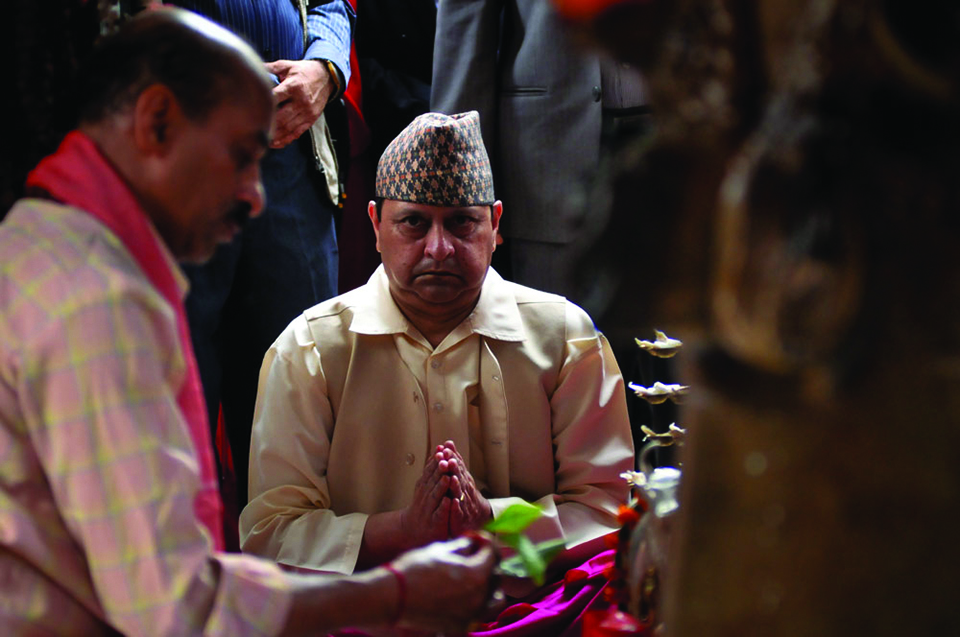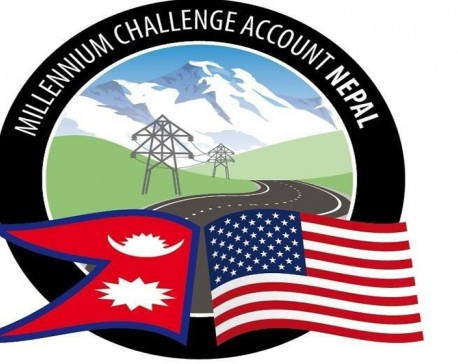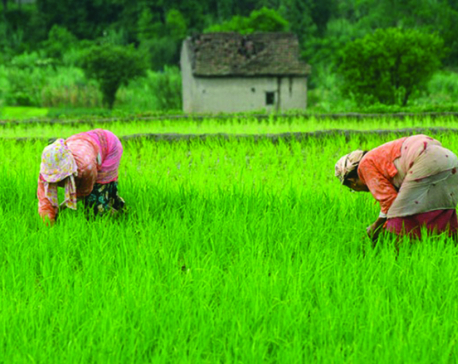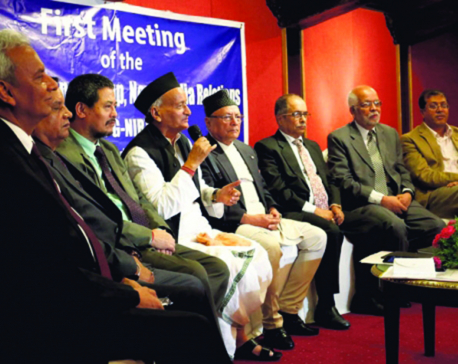
OR

Whatever the eventual outcome, the fact remains that space and shape of Nepal’s existing system is under tremendous stress
When a government with a two-thirds majority feels shamed by its failure to convince the general public about living up to its lofty promises of achieving “prosperous Nepal, happy Nepali” goal, anxiety and a sense of misadventure overtake it. Governments in Nepal—be they of the now main opposition Nepali Congress until the recent past or the two-headed Nepal Communist Party (NCP) presently—often betray their excessive sensitivity and pathetic lack of faith in themselves.
Hence the likes of Bimalendra Nidhi, as home minister in Sher Bahadur Deuba’s government, last year, Baburam Bhattarai, as a former premier, and, of late, Prime Minister KP Oli have reduced themselves to outbursts that only seem to raise former King Gyanendra’s stock in the public reassessment of public figures.
The Oli government talks of withholding passport to prevent the former monarch from travelling abroad. For someone those leaders dismiss as an effectively “has-been” and whose “fall” is attributed to “his own making”, it is a pathetic picture of mainstream party stalwarts getting jittery every time he is seen in public events or travels within or outside the country. They talked of jailing him and reopening the file on the royal massacre out of sheer vindictive bent of mind. Their incendiary comments courted combustible controversies that shook them to reticence in public.
Quite a few senior members of Nepali Congress, who previously welcomed Nepal as a federal republic, have begun finding a fundamental flaw in not giving the monarchy some space. “As a result, the nation now is in a political mess that is likely to deteriorate,” said a former speaker of the House of Representatives, with access to both Deuba and Koirala factions.
Prickly questions
The mainstream parties are gripped by what they fear is a clear and present danger, aggravated by their inability to deliver even a pale shadow of what they pledged to the people during the past 13 years that witnessed a posse of short-lived and short-sighted 12 governments.
Until the early 1990s, Indian newspapers used to be a staple for Nepalis as their direct source of information on current events. That is no longer the case. Online reports and comments from the next-door neighbor continue to attract attention. An article carried by an online news service recently sparked the air with thick speculation, as it named former King Gyanendra as one of the probable names for the seat of chief guest at India’s Republic Day celebrations in January. Tara Kartha, a regular contributor to First Post online channel, reported so. A Ph D, Kartha, spent 17 years at India’s National Security Council Secretariat, including an eight-year stint on terrorism and other security issues focused on the neighborhood at the Institute of Defense Studies and Analyses.
King Tribhuvan was the second VVIP to attend India’s Republic Day celebrations in 1951. King Birendra did so in 1999. Three Bhutanese kings have done so four times. Ministers, chief justice and others have also been thus honored. But all chief guests were incumbent state functionaries. That the former king’s name figured in the list of potential chief guests itself carries obvious significance.
Whatever the eventual outcome, the fact remains that space and shape of Nepal’s existing system is under tremendous stress. The new emphasis plods on a correction course for change covering continuity, with some of the characteristics of the existing mechanism and also embracing the balancing tradition of reliability and legitimately principled predictability.
Traumatic trail
On the eve of Tihar festival last fortnight, the former king’s quiet 11-day trip to South-East Asia triggered a spate of comments in public and private discussions while an avalanche of confusion, accompanied by sheer uncertainty, welled up among top-notch leaders of ruling and opposition parties. Although many speculate about a reported series of consultations in Bangkok, the precise venue is not yet ascertained. The former king was accompanied by only his personal secretary Sagar Timilsina. His meetings are said to be an exercise in “giving the final shape” to programs to be unveiled “in due course”.
Earlier this year, he went to Lucknow and, not long after, to Orissa in India, with the hosts providing VVIP security arrangements and addressing him as “King of Nepal”. The personal rapport between the former king and India’s chief minister of the largest State of Uttar Pradesh, Yogi Aditya Nath, is indicated by the latter’s admission to his close circle that he can be considered as “the King’s representative in India”. The visits were given wide coverage by local TV channels and newspapers, which hardly seem to notice Nepal’s official delegations.
In October, the former king attended Lakshya Yagya in Mumbai, performed with elaborate preparations and participation by personalities from all over India. During his stay stretching into the Dashain fortnight, he met with a number of high-profile members of the Indian government, including Home Minister Rajnath Singh and some of Prime Minister Narendra Modi’s top advisors. In 2017, the former king had made a sudden dash to New Delhi for a day-long exercise. Later during the 2017 Tihar festival, he told a Nepali TV news channel that it was time he became more active in the interests of the people and the nation.
Last fortnight, the very next day after the Dashain festival was formally over, he flew to the Thai capital, apparently on an urgent note, only nine days after his month-long trip to four countries, including Thailand. As a sequel to his latest trip, he plans to go on a month-long regional tour of eastern Nepal to fine-tune his impending programs.
In another development likely to carry long-term effects on the rest of South Asia, Bhutan might be in for greater interaction and cooperation with China. In recent weeks, there were at last three interesting articles toward that effect, penned by Indian commentators known to be close to the Delhi establishment. This speaks of a major shift in New Delhi’s approach to Beijing.
Moment of truth
Concerned over identity politics turning into a painful misadventure with deep-seated long-term implications, Sino-Indian interests converge on a number of vital issues. They note that the line between communalism and identity politics has blurred too deep. Beijing has convinced New Delhi about the powder-keg that identity politics could be, if foreign forces considered it expedient to trigger trouble in the target state.
Xinjiang, China’s largest administrative division, with a population of 21.8 million, is high on the West’s agenda. Its ethnic minorities include Uighur, Han, Kazakhs, Tajiks, Kyrgys, Mongols and Russians. Radical Islam is active in this area with large reserves of oil and minerals. The region borders also Beijing-administered Akasai Chin, which is claimed by India.
To the capitalist West, a communist government anywhere serves as a potent source of encouragement for the Red elsewhere. In Nepal, unpredictable and unreliable government feeding on greed attracts distrust from the industrial West that has begun to see an end to its world domination. Just released findings of a survey conducted by Nepal’s Staff College show that most people are disenchanted with recent governments, perceived as they are of having performed far below their public pledges.
At a time when the recent trend of events reinforces the portents of probable political changes ahead, the latest spate of inter-party and intra-party conflicts add to the woes of Nepal’s most powerful government in history. Should the situation prolong, it would only bolster the belief that a massive change might be inevitable. When and how it happens is the moot question—unless Prime Minister Oli pulls off a miracle in providing basic services, including the right to employment, and builds a credible reputation for the world’s most democratically elected communist government enjoying a highly comfortable majority.
You May Like This

MCC Nepal: A Leap toward Prosperity or a Surrender of Sovereignty?
MCC must come with some amendments and the clauses must be written more clearly, respecting the sovereignty and voices of... Read More...

Revolutionizing agriculture
Nepal aims to achieve a double-digit growth in the next five years. But this won’t be possible without agricultural revolution Read More...

Follow the recommendations
If the recommendations of EPGs are ignored, it might raise fresh resentment against India in Nepal ... Read More...







Just In
- NRB to provide collateral-free loans to foreign employment seekers
- NEB to publish Grade 12 results next week
- Body handover begins; Relatives remain dissatisfied with insurance, compensation amount
- NC defers its plan to join Koshi govt
- NRB to review microfinance loan interest rate
- 134 dead in floods and landslides since onset of monsoon this year
- Mahakali Irrigation Project sees only 22 percent physical progress in 18 years
- Singapore now holds world's most powerful passport; Nepal stays at 98th












Leave A Comment